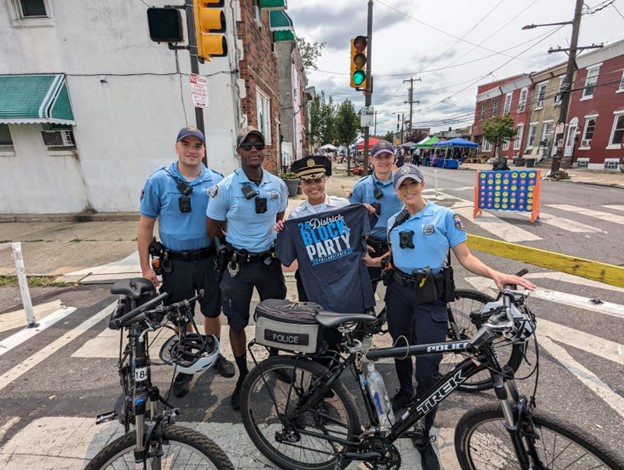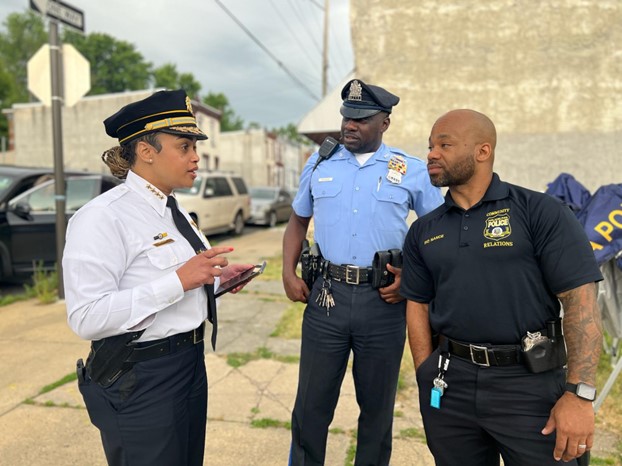|
September 9, 2023 Commissioner Danielle Outlaw discusses her experience in Philadelphia, Portland, and Oakland
PERF members, Danielle Outlaw has held police leadership roles in three very challenging cities: Oakland, Portland, and Philadelphia. She spent the first 20 years of her career with the Oakland Police Department, rising to serve as deputy chief from 2013-2017. From 2017-2019, she was chief of the Portland Police Bureau, and she has led the Philadelphia Police Department since 2020. Earlier this week she announced that she will be leaving that agency to become the deputy chief security officer for the Port Authority of New York and New Jersey. I spoke with Commissioner Outlaw about why she became a police officer, how Oakland, Portland, and Philadelphia differ, and what she’s learned from her time policing in those three cities. A longer version of this conversation is available as a podcast:
Commissioner Outlaw with officers at the annual block party held by the Philadelphia Police Department’s 24th District (PPD) Chuck Wexler: You grew up in Oakland. What was your perception of the Oakland police as a high school kid? Commissioner Outlaw: I split my time between East Oakland and South Berkeley. Whether I was in South Berkeley or Oakland, there was never a sense of feeling safe around police. And it wasn’t because I was in trouble. It wasn’t because I did anything wrong. I didn’t have law enforcement in my family. As the police drove down the street, I didn’t wave and say, Hi Officer such-and-such. We ran as kids, and we didn’t even do anything wrong. But we ran away because we didn’t have that sense of security when police were involved. So my perception of police was not favorable and they weren’t seen as heroes. Of course, I was taught to respect authority, but it was never something I thought I would grow up to become in a million years. Wexler: How did you end up participating in a career exploration program with the Oakland Police Department? Commissioner Outlaw: This was around the time of Rodney King. My high school had a two-week career exploration program in between semesters. It was a requirement to sign up for something, and somebody dared me to sign up for the Oakland Police Department. It was a dare because, given everything I just shared with you about my perceptions of police, I would never in a million years want to be inside a police department, near a police car, or a police officer in uniform. They ended up selecting me for this two-week career exploration program. And who knew that this experience would be one that changed my life professionally? Because after having the opportunity to ride with a police officer, joined at the hip as his “partner,” and learn the inner workings of the police department, I saw a completely different side of the uniform. Wexler: What specifically caught your attention? Commissioner Outlaw: I remember growing up seeing cops almost like robots. Again, not in a favorable light, and not an energy I really wanted to be around. But Officer Tim Sanchez, who was the officer I rode with for two weeks, was also from Oakland, and there’s a lot of pride in being from Oakland. He was like an uncle figure who liked a lot of the same restaurants, knew a lot of the places in Oakland, and also shared a lot of the history. So as we were driving around patrolling the streets, he would tell me about the history of Henry J. Kaiser and all the big buildings I’ve been around my whole life. I had no idea that there was that much more to Oakland. Then I’m thinking, Oh, cops do more than arrest people and take them to jail. They’re not only intelligent, but they’re also human beings with families and children and likes and concerns and compassion. Wexler: Tell me a little bit about your experience in the Oakland Police Department. Commissioner Outlaw: My professional experience with the Oakland police got me ready for anything. Nothing surprises me anymore, because you name it, it’s happened at OPD. Whether it’s scandal at the executive level, or dealing with internal and external communications around that, or revamping how we train, our internal affairs investigations, and our selection processes. The things our police department put in place, at the time no one else was doing them. So we had to research and develop our own thing, and then it became a benchmark. I left there as a deputy chief and took the chief of police job in Portland, which was also under a consent decree. I was prepared to handle that because I had experience doing that. Wexler: How was Portland different from Oakland? Commissioner Outlaw: I learned once I got there that Portland is different. I was like, Okay, Oakland is right next to Berkeley, a lot of people retired from Berkeley and moved to Portland, so I’m used to this. But when you move to the Pacific Northwest from anywhere, but particularly from California, there’s a different way to get things done. There’s a different way to come to consensus and there’s a different way to approach and speak with one another. I don’t want this to come off like it has a negative connotation, but it’s a bit passive aggressive. I had come from a place where you say what you mean and you mean what you say, and there’s no love lost. I don’t take it personally, I am very direct and then we move on and are able to get things accomplished. Not so much in Portland. It was the first time I heard someone use “At risk of offending” at the beginning of a sentence. I share this because when you’re trying to work in collaboration with all your stakeholders in a professional setting, you have to be very mindful of how you come across. You’re already a forceful command presence because you’re in uniform. But culturally and historically, the relationships between the police and the community and activists wasn’t always the best. So what may have taken an hour to figure out and problem solve in California may take a little bit longer, and you can’t be frustrated by that. It's a different way of doing business. Wexler: You were sworn in as the Philadelphia police commissioner on February 10, 2020, which turned out to be a very difficult time to take over a new organization. Commissioner Outlaw: This thing called COVID, a silent killer that no one knew about, just happened overnight. Human beings are social beings. And the very nature of policing is social. We’re interacting with other human beings, walking into strangers’ places, whether it’s homes or businesses, and we may have to touch someone and go hands on. There were all these things we had to consider. We ride two people to a car here because of the number of people we have. There weren’t enough cars for people to ride individually. So we really had to change the way we policed. Wexler: How did COVID affect your ability to connect with people? Commissioner Outlaw: It was a huge obstacle. I spent months onboarding in Portland, with community members as well as my internal folks. I didn’t have the ability to go to community meetings or meet with the leadership team in groups. So all of my onboarding was done virtually and all the warm touch points were lost. People were meeting me for the first time behind the screen, and you really can’t get to know anybody behind the screen. Philadelphia is an amazing place, but it’s very parochial. The joke here is, if you haven’t lived here for at least 17 years, you won’t be accepted. So you can imagine me as an outsider coming in, trying to meet people for the first time via camera and say, By the way, I am the authority during this crisis we’re in. And after that, it was crisis after crisis after crisis after crisis. But no one really knew me. Wexler: You’ve dealt with a lot of challenging issues during your career. What are some of the lessons you’ve learned? What would you do differently? Commissioner Outlaw: I would have gone with my gut and intuition earlier. I was hired in Philadelphia for some pretty specific reasons. I had a pretty extensive background dealing with unrest in various roles, including as a police chief. And when I saw what was happening in various cities after the murder of George Floyd, I said, You see what’s happening over there? We should probably ramp up. Everyone can look back with hindsight, so this isn’t pointing a finger at any one person or entity. But the response at the time was that this sort of thing doesn’t happen in Philadelphia. That happens in places like the West Coast, but it doesn’t happen here. I accepted that response, and I shouldn’t have. I should have insisted on ramping up and being prepared, because we all saw what happened after the fact. I took a picture out my office window of the National Guard protecting the police administration building, and that happened on more than one occasion. Never in my lifetime did I think that we would have to have the military coming in to protect the police. And I hope it never happens again. But we have to make sure that we prepare. We can always ramp down and pull away, but we have to prepare for what may come. Wexler: What are you most proud of accomplishing? Commissioner Outlaw: I still have an amazing relationship with my family, specifically my children. That’s important to me, because I’m a mother first. I just happened to be a cop. Everybody says, Are you proud to be the first Black female police chief in two places? Yes, it’s great. It’s an accomplishment. I recognize that I’m a trailblazer. But I still have an amazing relationship with my family, specifically my children. And that’s extremely important to me because there’s so much sacrifice that’s made in these roles. The second thing would be that I led the fourth largest police department in the country through one of the most challenging times in the history of policing, and I’m still standing. It takes a lot to be able to withstand what we all did during this pandemic era and now immediate post-pandemic era. Wexler: What are you going to do next? Commissioner Outlaw: I have accepted a role as deputy chief security officer for the Port Authority of New York and New Jersey. So I’ll be tackling the world of critical infrastructure, transportation, and all things security and public safety in that realm. I’m really looking forward to it. Wexler: Is there anything else you’d like to add? Commissioner Outlaw: I recognize that I got started in this younger than a lot of my colleagues. But I still have the opportunity to look back and see how policing has evolved and changed. And I would encourage the next group of leaders coming up to stick with their guts and intuition. Look beyond what’s in the brochure, ask questions, be strategic, and recognize they can’t do this alone.
Commissioner Outlaw speaking with officers in the Philadelphia Police Department’s 25th District (PPD) Thanks to Commissioner Outlaw for taking the time to speak with me during a busy week. Best, Chuck |


